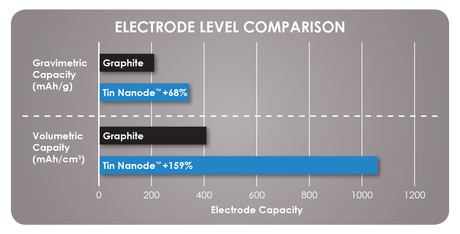Qld battery innovator forms US agreements

Australian battery technology innovator Nano-Nouvelle has established agreements with specialist US manufacturers to show how its innovative 3D nanotechnology can improve their battery performance.
The companies, which produce high-performance batteries used in specialised industries such as aerospace, have agreed to test how Nano-Nouvelle’s Nanode nanomaterials work with their batteries.
Nano-Nouvelle CEO Stephanie Moroz, who met with executives from the two companies at a global battery conference in Chicago, said these high-performance battery manufacturers were ideal partners for the company’s technology. “They provide a great initial entry point for us,” she said.
“It’s hard to go from zero to high-volume production; however, Nano-Nouvelle is in a good position to support field trials by specialist companies, which work at smaller volumes, are less cost-sensitive and are incredibly focused on improving the performance of their batteries.
“As Tesla proved with its Roadster EV sports car, this sort of low-volume, high-margin starting point can provide a high-visibility platform to demonstrate the benefits of innovative technology, which can accelerate its adoption by mass market manufacturers.”
Sunshine Coast-based Nano-Nouvelle is developing world-leading nanotechnology that can boost the energy storage capacity of lithium-ion batteries by as much as 50%. An important part of Nano-Nouvelle’s strategy involves working out how to implement its innovative nanotechnology into current manufacturing processes.
Moroz met the US executives at the 18th International Meeting on Lithium Batteries, a biennial symposium which attracted more than 1500 delegates from Europe, Asia and the US. A strong focus for the conference was how to maximise energy capacity and performance lifetime for batteries that power electric vehicles (EVs), which last year passed the one-million-car milestone globally.
Moroz said the focus of battery research had undergone a noticeable shift since the 2014 conference. “Whereas two years ago, it was mainly about portable electronics and wearables, the focus is now on batteries for EVs and energy storage,” she said.
“People want to drive EVs and put energy storage batteries in their homes, but the delay between a scientific breakthrough and a commercial product can take as long as 10 years. The good news for us from this conference is that the battery industry has stopped chasing blue-sky technologies to focus on improving lithium-ion performance, which is where our products can deliver real value.”
Nano-Nouvelle’s core technology, the Nanode, overcomes the current limitations of high-energy and high-power batteries. By using nanotechnology to create a conductive membrane with complex 3D surfaces, the company’s patent-protected technology pushes the boundaries of high-performance battery electrodes, effectively laying the foundation for a new generation of high-capacity batteries.
Moroz said Nano-Nouvelle was already working with battery companies globally, from specialist manufacturers to mass market companies, to demonstrate that its technology both improved battery performance significantly and could be deployed easily into existing production systems. “We’re looking to make it plug and play for battery manufacturers,” she said.
“Our goal is for them to take our electrode, match it with their other components and run it through their standard assembly processes. While they end up making higher performance batteries, the actual production deployment will require minimal effort on their part.”
Four ways AI can finally make threat intelligence useful and not just noisy
Done poorly, threat intelligence is noise. But done well, it becomes one of the most powerful...
Australia’s top tech priorities for 2026
It is anticipated that AI will evolve from a pilot project to a productive standard, underpinned...
Why AI's longevity lies in utility, not novelty
The real potential of AI is in underpinning the invisible systems powering everyday business.







